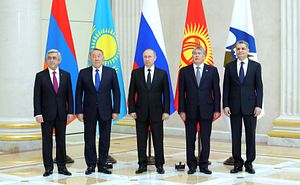Russian President Vladimir Putin sounded very optimistic when lauding the Eurasian Economic Union’s progress Monday at a meeting of the Supreme Eurasian Economic Council in Saint Petersburg. The EEU will mark its second birthday on January 1, 2017.
The five countries of the EEU, Putin said, had already established “a large common market” operating according to World Trade Organization principles. “We have worked consistently to remove barriers to the free movement of goods, services, labor and capital.”
Last week, Kremlin spokesman Dmitry Peskov, in an interview with Mir TV, said that Putin viewed the collapse of the Soviet Union as a “disaster” which pushed back development in the ensuing independent states. While Peskov noted that it was “impossible” to talk about reversing the dissolution, he did attest that “logic dictates the need of new integration in the space of the former Soviet Union.”
For the Kremlin, a major piece of that “new integration” narrative is the EEU. Peskov pointed to the European Union as a model, of sorts. Like the EEU, the EU evolved from successively more integrated frameworks.
Peskov, according to TASS at least, referenced the Eurasian Economic Community (EurAsEC), but that organization officially ceased to exist when the EEU launched in 2015.
“After all, the European Union has been developing for many decades as compared to the EurAsEC and there are a lot of problems,” Peskov said, by way of fending off criticism of the organization in its early years. “That is why, we need to be patient but the positive yield from this integration is obvious and is not disputed by anyone.”
That’s not completely true. From the Kyrgyz perspective, joining the EEU seemed all but unavoidable but Bishkek dragged its feet and has been less than optimistic about the effects of joining.
At a November meeting, Kyrgyz Prime Minister Sooronbay Jeenbekov gripped over blocked access to the union’s common market. And this week, Kyrgyzstan first refused to sign the Treaty on the Eurasian Economic Union Customs Code but apparently agreed later to sign, though with an exception.
Tigran Sargsyan, chairman of board of the Eurasian Economic Commission (EEC), said the Kyrgyz approved the customs code, but did not sign a statement on the development of trade and economic policy. “This is due to the fact that our Kyrgyz colleagues propose to clarify the wording on the priority of removal of barriers on the internal markets. The rest of the documents were signed by all the presidents,” he said. (Except for the president of Belarus, Alexander Lukashenko, who did not attend the meeting.)
Kazakhstan seems to be Kyrgyzstan’s biggest problem vis-a-vis the EEU. According to 24.kg, Kyrgyz Deputy Prime Minister Oleg Pankratov told journalists that the Kazakhs had not yet cancelled veterinary controls on the border. “All countries, except for Kazakhstan, and the Eurasian Economic Commission noted that there were no risk and spoke for removal of the control. But Kazakh colleagues once again did not support the issue.” But, the Kazakhs did apparently sign an agreement to provide $100 million in technical assistance to resolve the control issues.
Pankratov, nearly a year ago, said “[t]he effect of Kyrgyzstan’s accession to the Eurasian Economic Union turned out to be blurry.”
That assessment remains a good one. In its June update, the World Bank’s Global Economic Outlook forecasted Kyrgyz GDP growth at 3.4 percent in 2016 after growth in 2015 estimated at 3.5 percent and 4.0 percent in 2014. The World Bank forecasts Kyrgyz growth to barely inch up over the next few years, touching 4.1 percent in 2018. Whether EEU membership can help the Kyrgyz economic remains as unclear as ever, but politically, Bishkek has few options.
Meanwhile, if Putin’s speech is any indication, Moscow has big plans for the EEU. Putin spoke of a “favorable business climate,” and developing a “common digital space.” He also heralded “interesting an fruitful” developments with regard to the EEU’s external relations, via free trade agreements signed already with Vietnam and proposed with Israel, India, Iran, Singapore and Egypt.
































